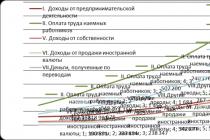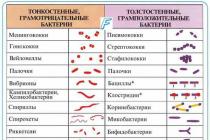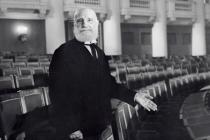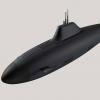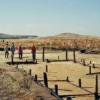During the filming of the film "Before the Court of History" (1964). Monarchist V. V. Shulgin in the Kremlin Palace of Congresses
The second variety of monarchists who lived in the USSR are monarchists who acted within the framework of Soviet legality. The most striking example of such a figure is Vasily Vitalievich Shulgin (1878-1976). True, before becoming "the most important Soviet monarchist," he had to serve his term in the Vladimir prison. And even then he was lucky in the sense that in 1947, when he was tried, the death penalty in the USSR had already been abolished.
But in September 1956, Shulgin was released. He by no means renounced his monarchical views, and he himself later wrote: "Having been pardoned and brought repentance, Shulgin would not have been worth a penny and could only cause contemptuous regret." But he tried to adapt his old beliefs to the new reality and, moreover, to express them openly. And the most amazing thing is that he succeeded... With the skill and talent of an experienced parliamentary orator, Shulgin persistently pushed the ideas of monarchism and Stolypinism into legal Soviet politics and journalism. He skillfully clothed them in a very neat, censorship acceptable form. And he did it - both in his book "Letters to Russian Emigrants" published in the 60s, and in the documentary film "Before the Court of History", which was filmed about him at the same time. And in other works, including memoirs that went out of print after his death, in 1979, by the APN publishing house. Shulgin met with public figures related to him: for example, none other than Alexander Solzhenitsyn came to see him in Vladimir. Shulgin's articles appeared in Pravda, he spoke on the radio. And, finally, as the pinnacle of everything, the former ideologist of the White Guard and the author of the slogan "Fascists of all countries, unite!" In 1961 he was invited to the XXII Congress of the CPSU and participated in it as a guest.

During the filming of "Before the Court of History." Shulgin in the Tauride Palace (Leningrad), where the State Duma met until 1917. "Here it is, the Russian parliament!".
Shulgin in the film took the place that he occupied in the meeting room of the former State Duma

Shulgin in the railway trailer, where he received the abdication of Emperor Nicholas II
How did he do it? I once wrote that the prohibition of expressing any views only leads to the fact that they are carefully masked with a layer of cotton candy. A more strict prohibition leads to wrapping with two, three, ten layers of cotton candy ... But the inner grain does not disappear from this, it just becomes more difficult to recognize it under the honey shell and object to it. Shulgin mastered this art to the fullest.
The Soviet director and communist Friedrich Ermler recalled his meeting at Lenfilm with Shulgin: “If I had met him in 1924, I would have done everything so that my conclusion ended with the word“ shoot. And suddenly I saw the Apostle Peter, blind, with a cane. An old man appeared before me, who looked at me for a long time, and then said: “You are very pale. You, my dear, must be protected. I am a bison, I will stand…” In other words, instead of a fierce class enemy, which Shulgin undoubtedly was ("bison" before the revolution called ardent monarchists, Black Hundreds, this expression can be found in Lenin), his Soviet opponents were surprised to find almost a saint. He was reminded of his former, by no means holy words and feelings (published, by the way, in the USSR back in the 1920s along with Shulgin's book "Days"); for example, at the sight of a revolutionary street crowd in February 1917:
"Soldiers, workers, students, intellectuals, just people ... The endless, inexhaustible stream of human water supply threw more and more new faces into the Duma ... But no matter how many there were, they all had one face: vile-animal-stupid or vile "devilishly vicious... God, how disgusting it was! So disgusting that, gritting my teeth, I felt in myself one melancholy, powerless, and therefore even more vicious fury... Machine guns - that's what I wanted. For I felt, that only the language of machine guns is accessible to the street crowd, and that only lead, lead, can drive back into its lair a terrible beast that has escaped to freedom ... Alas, this beast was ... His Majesty the Russian people ... Ah, machine guns here, machine guns! .."
And one more thing: "Nicholas I hanged five Decembrists, but if Nicholas II shoots 50,000 "Febralists", then it will be for the cheaply bought salvation of Russia."

Books by V. V. Shulgin, published in the USSR in the 1920s
Vasily Vitalievich answered evasively and eloquently to reminders: “I said, I don’t renounce ... But you seem to deny the passage of time in this case ... How can I now, having a white beard, speak like that Shulgin, with a mustache ?. ."
Shulgin was also caustically reminded of his praises of the 1920s against the fascists, when he called Stolypin, whom he revered, "Mussolini's forerunner" and "the founder of Russian fascism." Shulgin, in response, only asked "not to confuse Italian fascism and German Nazism" ...
The film Before the Judgment of History, which became Ermler's "swan song", was difficult to shoot, filming went from 1962 to 1965. The reason was that the obstinate monarchist "showed character" and did not agree to utter a single word in the frame with which he himself would not agree. According to KGB General Philip Bobkov, who oversaw the creation of the film from the department and closely communicated with the entire creative team, “Shulgin looked great on the screen and, importantly, remained himself all the time. He did not play along with his interlocutor. He was a man resigned to the circumstances, but not broken and not relinquishing his convictions. The venerable age of Shulgin did not affect either the work of thought or temperament, and did not diminish his sarcasm either. His young opponent, whom Shulgin caustically and maliciously ridiculed, looked very pale next to him. In Lenfilm's large-circulation newspaper "Kadr" an article "Meeting with the Enemy" was printed. In it, the director, People's Artist of the USSR and Ermler's friend Alexander Ivanov wrote: “The appearance on the screen of a seasoned enemy of Soviet power is impressive. The inner aristocracy of this monarchist is so convincing that you listen not only to what he says, but with tension you follow how he says ... Here he is now so decent, at times pitiful and even seemingly cute. But this man is terrible. They were followed by hundreds of thousands of people who laid down their lives for their ideas.”
As a result, the film was shown on the wide screens of Moscow and Leningrad cinemas for only three days: despite the great interest of the audience, it was removed from the rental ahead of schedule, and then it was rarely shown.
And with his book Letters to Russian Emigrants, Shulgin was also dissatisfied, for its insufficient radicalism, and in 1970 he wrote about it like this: “I don’t like this book. There are no lies here, but there are mistakes on my part, an unsuccessful deception on the part of certain people. Therefore, the "Letters" did not reach the goal. The emigrants did not believe both what was wrong and what was stated exactly. It's a pity."

Shulgin's conversation with the old Bolshevik Petrov
The culmination of the film "Before the Judgment of History" was Shulgin's meeting with the legendary revolutionary, a member of the CPSU since 1896, Fyodor Nikolaevich Petrov (1876-1973). Meeting of an old Bolshevik and an old monarchist. On the screen, Vasily Vitalievich literally flooded his opponent with an oil of praise and compliments, thereby completely disarming him. At the end of the conversation, the softened Petrov agreed to shake hands with Shulgin on camera. And behind the scenes, Vasily Vitalievich spoke about his opponent, as befits a class enemy, maliciously and contemptuously: "In the film" Before the Court of History "I had to invent dialogues with my opponent, the Bolshevik Petrov, who turned out to be very stupid."

At the end of the conversation, Petrov agreed to shake hands with Shulgin
And Nikita Khrushchev in March 1963, in one of his speeches, spoke about Shulgin like this: “I saw people. Take, for example, Shulgin, comrades. Shulgin. Monarchist. Leader of monarchists. And now, now he ... of course, is not a communist, - and thank God that he is not a communist ... (Laughter in the audience) Because he cannot be a communist. But that he, so to speak, displays patriotism, this ... this is a fact. in America, and at that time his articles were printed there, - those who used to eat his juices spat on him. So, you know, these are such millstones that grind into flour, you know, granite. Either they wash it, or people polish it and grow stronger, and become in the ranks of good people."
By the way, the presence of Shulgin in the political life of the USSR was perceived rather disapprovingly by public opinion. This can be judged, in particular, by the well-known anecdote "What did Nikita Khrushchev do and what did not have time to do?". "I managed to invite the monarchist Shulgin as a guest at the XXII Party Congress. I did not have time to award Nicholas II and Grigory Rasputin posthumously with the Order of the October Revolution for creating a revolutionary situation in Russia." That is, the "political resurrection" of Shulgin in the 60s, and even more so the invitation of the monarchist to the congress of the Communist Party, was widely regarded by the people as a manifestation of Khrushchev's "voluntarism" (simply speaking, ridiculous tyranny). However, the film "Before the Judgment of History" was released when Khrushchev was no longer in the Kremlin, and Shulgin's memoirs "Years" appeared out of print in the late 70s.

Shulgin shows his "patriotism"

Books by V. V. Shulgin, published in the USSR in the 60s and 70s
Well, what relevant lessons can be learned from the above? First, one must know how not to be deceived by the appearance of a “saint”, which any experienced class enemy can take on. Secondly, one must be able, if necessary, to own and use this obligatory political device. And thirdly, one must understand that a legal, open, but still quite frank monarchist, like Shulgin, was still far from the most dangerous variety of monarchists in the USSR ...
The third variety of Soviet monarchists will be discussed later.

Memorial plaque erected on January 13, 2008, on the 130th anniversary of the birth of Shulgin at house number 1 on Feygin Street in Vladimir
Poster for the film "Before the Judgment of History": 
Film "Before the Judgment of History"
Russian politician, publicist Vasily Vitalievich Shulgin was born on January 13 (January 1, old style) 1878 in Kiev in the family of historian Vitaly Shulgin. His father died in the year his son was born, the boy was raised by his stepfather, scientist-economist Dmitry Pikhno, editor of the monarchist newspaper Kievlyanin (replaced Vitaly Shulgin in this position), later a member of the State Council.
In 1900, Vasily Shulgin graduated from the law faculty of Kiev University, and studied at the Kiev Polytechnic Institute for another year.
He was elected zemstvo vowel, an honorary justice of the peace, and became the leading journalist of Kievlyanin.
Member of the II, III and IV State Duma from the Volyn province. First elected in 1907. Initially, he was a member of the right-wing faction. He participated in the activities of monarchist organizations: he was a full member of the Russian Assembly (1911-1913) and was a member of its council; took part in the activities of the Main Chamber of the Russian People's Union. Michael the Archangel, was a member of the commission for compiling the Book of Russian Sorrow and the Chronicle of the Troubled Pogroms of 1905-1907.
After the outbreak of the First World War, Shulgin went to the front as a volunteer. In the rank of ensign of the 166th Rivne Infantry Regiment of the South-Western Front, he participated in the battles. He was wounded, after being wounded he led the zemstvo advanced dressing and feeding detachment.
In August 1915, Shulgin left the nationalist faction in the State Duma and formed the Progressive Group of Nationalists. At the same time, he joined the leadership of the Progressive Bloc, in which he saw an alliance between the "conservative and liberal parts of society", becoming close to former political opponents.
In March (February, Old Style) 1917, Shulgin was elected to the Provisional Committee of the State Duma. On March 15 (March 2, according to the old style), he, together with Alexander Guchkov, was sent to Pskov for negotiations with the emperor and was present at the signing of the abdication manifesto in favor of Grand Duke Mikhail Alexandrovich, which he subsequently wrote in detail in his book Days. The next day, March 16 (March 3, old style), he was present at the refusal of Mikhail Alexandrovich from the throne and participated in the drafting and editing of the act of renunciation.
According to the conclusion of the General Prosecutor's Office of the Russian Federation dated November 12, 2001, he was rehabilitated.
In 2008, in Vladimir, at house No. 1 on Feygin Street, where Shulgin lived from 1960 to 1976, a memorial plaque was installed.
The material was prepared on the basis of information from open sources
Vasily Shulgin was not a simple participant in the revolution. It was he, a deputy of three State Dumas and a desperate monarchist, paradoxically, who accepted the abdication of Nicholas II, and later became one of the organizers and ideologists of the White movement. All the more valuable is the unknown evidence of Shulgin found in the archive, in which he tries to explain the causes of the Russian revolution and the Civil War. Perhaps this rare testimony will bring us a little closer to understanding the tragic events of the revolutionary era, the centenary of which is not far off.
Valery Levitsky and Vasily Shulgin
In the richest collection of memoirs of emigrants from the "Prague Collection" of the State Archives of the Russian Federation, the memoirs of cadet Valery Mikhailovich Levitsky (1886-1946) were deposited. Levitsky was one of the people who did not actively accept the revolution and participated in the White movement. Most of all, he showed himself in the field of journalism, actively collaborating with the most prominent figure in the white camp, Vasily Vitalievich Shulgin (1878-1976) 1 . Levitsky published in the Yekaterinodar newspaper Rossiya, which was edited by Shulgin; in the Odessa newspaper - with the same name, which became the actual legal successor of the Yekaterinodar edition; was the editor of "Great Russia", which, in turn, was published in Yekaterinodar and Rostov-on-Don. Levitsky was not a figure in the first rank of the so-called "Russian public" - he was not a personality like Shulgin or Milyukov; at the same time, Levitsky worked in Shulgin's "team" and was quite politically close to him. That is why Vasily Vitalievich considered it possible to preface Valery Mikhailovich's memoirs, which were never published in full, and called "The Struggle in the South" 2 , with a brief preface published on the pages of our journal.
"Unanswered" questions
In this text, Shulgin made an attempt to explain the origin of the Russian revolution, the Civil War and the defeat of the White movement in it, which echoes the diary of V.V. Shulgin for February 1918 3 All his life Shulgin tried to give himself an answer to these "unanswerable" questions: why did the revolution happen? Was autocracy doomed? Why did the Reds win the Civil War and not the Whites? Were whites the moral winners in this war? It seems to us that Shulgin came closer to answering these questions than other thinkers of his time.
Emphasized romanticism, characteristic of Shulgin, was also manifested in his views on the White movement. Shulgin himself described his concept of the White movement as a "monarchist utopia", noting that the main premise of the White cause is "obedience to the leader", noting that "his (the leader. - A.P.) conscience decides what is possible and should, and what no. The rest obey" 4 . Just with this "obedience," Shulgin believed, at the decisive moment, everything turned out to be unimportant. In particular, Shulgin, who had an exceptional literary talent, argued that Denikin's army lost because the whites "did not remain at the height of whiteness ... (the lines belong to V.V. Shulgin. - A.P.) But this could not be ... After all, if we were white by nature, no revolution would have occurred. Power is not torn out of truly white hands ... We were not white in essence, and therefore a revolution took place. But when it happened, we, being gray and dirty, yet rushed to the defense of the white banner raised by a few Russians, whom Russia may not be ashamed of... Sinners, we went after the saints... Cowards, we went after the heroes Low in soul, we went after the ideal of the White struggle. although we often soiled the white banner with our dirty hands, nevertheless we held it over Russia as much as we could, not sparing our belly and abundantly watering its foot, albeit sinful, but still with our own blood. That is, according to Shulgin, the reason for the defeat is the "Greys" and "Dirty", which, "alas, not a small number clung to the White Army" 6 .
The former, as Vasily Vitalievich pointed out, "hid and messed around, the latter stole, robbed and killed not in the name of a heavy duty, but actually for the sake of a sadistic, perverted dirty bloody pleasure..." 7 . The "Greys" and "Dirty" lose honor and morality, which means that the Whites lose, because, according to Shulgin, "a white cause cannot be won if honor and morality are lost" 8 .
The Whites, as Shulgin wrote in the days of the collapse of Denikin's front, hated the Russian people, "armed the Red Army" and, in fact, adopting the Bolshevik slogan "Rob the loot!" in relation to their own compatriots, thereby "give Lenin a hand across the front" 9 . The army was tired of hardships and wished to receive trophies from the "grateful population": "The microbe of self-will captured the entire army. It woke up, as you know, only in the Crimea, having lost all its conquests," V.V. Shulgin in one of his articles 10 .
Volunteers, villains and non-volunteers
Volunteers, according to Shulgin, began to turn into Zlovoltsev: “Next to the withering lily of goodwill, a violent tide of Evil-will bloomed. The evil-volunteers quickly figured out the secret of Denikin’s kingdom - the kingdom of “dictatorship in words”, the absence of that iron will, before which the Good ones stand in joyful formation and before which "The Evil Ones bow down, gritting their teeth. The Evil Ones perfectly understood that one can indulge in one's nature with impunity. As for the third element - the large layer lying between the volunteers and the Evil Ones - namely Bezvoltsev, then a wonderful excuse was found for them: since the authorities do not care about us ", then we have the right to take care of ourselves. Since Denikin does not give, we must take it ourselves. As soon as this word was uttered: "to take it ourselves", everything rolled down an inclined plane. This plane is characterized by two truths; one Russian: "the soul knows the measure ", and another French: "appetite comes with eating" ... And off we go. Volts killed, and the population, looking at all this, sadly raised its hands to the sky: here are the Volunteers! It did not know that there were actually no more volunteers, but a poorly disciplined army of ordinary Russian people, whose “hillock of property” had never been distinguished by excessive development.
Whites have ceased to be white, and this is the reason for their defeat. In addition, the counter-revolution, as Shulgin believed, was unable to put forward a single new name either in the field of military or in the field of civil administration: "there are no new people, but there are few old ones, and they lost heart" 12.
Already in exile, Shulgin wrote, detailing the previous statement: “This was our tragedy. After all, the revolution happened precisely because the human Stoff (material - German - A.P.), which made up the state fabric, could not stand it and burst. And now, from these scraps, from shreds of unsustainable material, it was necessary to rebuild the Russian state. If only there was confidence that Stoff's scraps improved during the revolution in terms of quality factor. But no. In the mass they rather worsened. Although they have grown wiser politically, but morally even more loosened up" 13 . At the same time, Shulgin noted: “Yes, our path seemed glorious then ... After a short time, it became only a “godfather”, difficult, but fame flew away. All the same ... Great years will pass, and glory will return ... Because with all our shortcomings, we nevertheless turned out to be from that damask that could not be led to the slaughter by "live cattle": we did not go, we took up rifles and gave a "fight" ... We were defeated, but we defended our right to be called people ... This is our glory, and our descendants will give it to us" 14 .
Levitsky, sending his manuscript to the Prague archive, dated "The Struggle in the South" to 1923, however, under the preface of V.V. Shulgin set a different date - October 15, 1922, Prague. Title provided by the publisher.
V.V. Shulgin Preface
The so-called "Struggle in the South", in other words, the tragedy associated with the names of Alekseev, Kornilov, Denikin and Wrangel, still has [neither] its external historian, nor its external interpretation, neither Homer nor Sophocles. The time has not yet come to cover this grandiose process with a general and true picture, in which the main thing will be in the first place, the details in their own place, and the author of the historian from the mink of an eyewitness, who knows only his part well, will rise to a height from which the whole panorama will unfold. Now we are still in the zone of personal experiences. It cannot be otherwise, and there is nothing to be embarrassed about. After all, in order to integrate, you must first write a differentiated equation. We, those who were, in one form or another, participants in the South Russian struggle, can write a differentiated equation, i.e., write down the process in infinitesimal terms, and the integral, i.e., the chapter, will depend on this, how correctly we write it. Russian revolution, called the white movement, represented not in its elements, but in all its value. At the same time, we must also remember that our quite natural, but premature attempts at generalizations, i.e. integration now, it is necessary to consider only as elements. After all, these attempts are a condensation of the views of the participants in the events on what is happening. These views may or may not be correct, but in any case they were real forces that influenced the development of events to one degree or another. To refrain entirely from generalizations would be to hide the reasons why people acted differently.
The true culprit of our tragedy was philistine indifference, frivolity and immorality. The Russian philistine, for whose salvation the struggle was essentially going on, at first believed that he would be best saved if he sat quietly and peacefully. Therefore, at the beginning, when the Volunteer Army was really volunteer, he supplied volunteers in an insignificant amount for Russia. When the army of General Denikin switched to a system of mobilizations, the mobilized philistine took revenge by revealing his true, far from white nature ... Philistine filled the troops and administration. She poured her usual qualities into the White movement: neurotic irritability, inconstancy, extravagance, an irresistible need for slander and spitefulness, and a complete lack of respect for other people's property. It was that same Russian philistine or public that had sympathetically watched for so many years how politicians of various stripes taught the peasant how to rob the landowner, celebrated the murders of ministers and policemen, beat their hands, applauding the tenors and basses from the student youth, who were playing "Dubinushka". The people woke up; he found a club and hooted ... Only with one end on the landowners, generals and ministers, and on the other - on this same Russian intelligentsia, which called out so much and, finally, called the club. From an unexpected blow, the brains of the layman-intellectual turned from left to right, but that was all: the club could not change the essence, the foundations of his nature. Therefore, when he received a rifle from the white hands of General Denikin "to save Russia", he instead took up a business that was more in line with his spiritual consistency: instead of one landowner, he robbed both the landowner, and the peasants, and whoever. Instead of ministers and policemen, he killed "Kids" and unarmed "communists". And instead of a club, he secretly and clearly dreamed of how to hang all the "cadets", meaning by this name all those who tried to curb his savagery.

In vain a handful of true whites struggled with this yellow stream. Only a terrible catastrophe could bring them to their senses: it broke out. The history of the Crusades was exactly repeated. The lofty idea of the liberation of the Holy Sepulcher exceeded the strength of the few true crusaders. I had to rely on wider circles, to mobilize society. The then general public consisted of the "pink", who understood courage as the right to get drunk, play dice, bandit on the highways and quarrel wildly among themselves. When they were called to a holy cause, they trampled it into the mud. Nevertheless, the crusades will forever remain in the memory of mankind, as a high impulse that originated in the moral abysses of the Middle Ages. The same bright memory will be left behind by the case of Alekseev, Kornilov, Denikin and Wrangel.
Our common mistake, if we can speak of mistakes in this case, was that we overestimated this human material with which we operated, hypnotized by examples of the extraordinary valor of real white volunteers, we attributed these qualities to all the narrow-minded people that we included in our ranks. Having mobilized this narrow-minded people, we set before them a superheroic task. It may be natural that the layman could not fulfill it. The Bolsheviks defeated us with a sense of reality. By the end of 1919, all idealization of the Bolshevik movement was over. "Paradise" was buried by the horror of the life they created, their moral character inspired only disgust. But he also inspired fear. The Bolsheviks understood this. They understood and used it with might and main, with terror and discipline they bribed the Russian inhabitant and drove him to the whites. They did not set heroic tasks, they did not demand a feat, they demanded obedience, obedience was rendered to them.
GARF. F. R-5881.
Op. 2. D. 449. L. 1 c - 1 e. Typescript with handwritten inserts.
Notes
1. For more information about Shulgin during the years of the Civil War, see: Puchenkov A.S. National policy of General Denikin (spring 1918 - spring 1920). St. Petersburg, 2012, pp. 169-180, 191-200, pp. 246-259; He is. Ukraine and Crimea in 1918 - early 1919. Essays on political history. SPb., 2013. S. 22-39, S. 102-105.
2. Publication of a fragment of the memoirs of V.M. Levitsky, see: Puchenkov A.S. Ukraine and Crimea in 1918 - early 1919. pp. 238-246.
3. Shulgin V.V. "The situation is simply diabolical ..." (Diary of February 1918) / Introductory article, publication and comments by A.S. Puchenkova // Russian past. Historical and documentary almanac. 2010. Book. 11. S. 98-109.
4. GARF. F. R-5974. Op. 1. D. 15. L. 28, 79.
5. Ibid. L. 92-93.
6. Shulgin V.V. What we don't like about them: On anti-Semitism in Russia. SPb., 1992. S. 67.
7. Shulgin V.V. days. 1920: Notes. M., 1989. S. 527.
8. Ibid. S. 294.
9. Shulgin V. Dubrovskie // Great Russia (Novorossiysk). 1920. February 8.
10. Shulgin V. Russian outcome // Russian newspaper. 1924. May 7.
11. Shulgin V. On vacation // New time (Belgrade). 1924. June 28.
12. Shulgin V. "The rear lags behind the front" // Kievan. 1919. September 1.
13. GARF. F. R-5974. Op. 1. D. 18. L. 97.
14. Ibid. L. 123.
Shulgin Vasily Vitalievich - (January 13, 1878 - February 15, 1976) - Russian nationalist and publicist. Member of the second, third and fourth State Duma, monarchist and member of the White movement.
Shulgin was born in Kiev in the family of historian Vitaly Shulgin. Vasily's father died a month before his birth, and the boy was raised by his stepfather, scientist-economist Dmitry Pikhno, editor of the Kievan monarchist newspaper (replaced V. Ya. Shulgin in this position), later a member of the State Council. Shulgin studied law at Kiev University. A negative attitude towards the revolution was formed in him at the university, when he constantly became an eyewitness to the riots organized by revolutionary-minded students. Shulgin's stepfather got him a job at his newspaper. Shulgin promoted anti-Semitism in his publications. Due to tactical considerations, Shulgin criticized the Beilis case, since it was obvious that this odious process played into the hands of only the opponents of the monarchy. This was the reason for criticism of Shulgin by some radical nationalists, in particular, M. O. Menshikov called him a "Jewish Janissary" in his article "Little Zola"
In 1907, Shulgin became a member of the State Duma and the leader of the nationalist faction in the IV Duma. He advocated far-right views, supported the Stolypin government, including the introduction of courts-martial and other controversial reforms. With the outbreak of World War I, Shulgin went to the front, but in 1915 he was wounded and returned. On February 27, 1917, the Council of Elders of the Duma V.V. Shulgin was elected to the Provisional Committee of the State Duma, which took over the functions of the government. The Provisional Committee decided that Emperor Nicholas II should immediately abdicate in favor of his son Alexei under the regency of his brother, Grand Duke Mikhail Alexandrovich.
On March 2, the Provisional Committee sent V.V. to the tsar in Pskov for negotiations. Shulgin and A.I. Guchkov. But Nicholas II signed the Act of Abdication in favor of the brother of the Grand Duke Mikhail Alexandrovich. 03 March V.V. Shulgin took part in negotiations with Grand Duke Mikhail Alexandrovich, as a result of which he refused to accept the throne until the decision of the Constituent Assembly. April 26, 1917 V.V. Shulgin admitted: "I can't say that the entire Duma wanted a revolution entirely; all this would be untrue .... But, even without wanting it, we created a revolution."
V.V. Shulgin strongly supported the Provisional Government, but, seeing its inability to restore order in the country, in early October 1917 he moved to Kiev. There he headed the "Russian National Union".
After the October Revolution, V.V. Shulgin created the underground organization "Azbuka" in Kiev in order to fight against Bolshevism. In November-December 1917 he went to the Don to Novocherkassk, participated in the creation of the White Volunteer Army. From the end of 1918 he edited the newspaper "Russia", then "Great Russia", praising the monarchist and nationalist principles and the purity of the "white idea". When the hope of anti-Bolshevik forces coming to power was lost, Shulgin first moved to Kiev, where he took part in the activities of the White Guard organizations (Azbuka), later emigrated to Yugoslavia.
In 1925-26. he secretly visited the Soviet Union, describing his impressions of the NEP in the book Three Capitals. In exile, Shulgin maintained contacts with other leaders of the White movement until 1937, when he finally ceased political activity. In 1925-1926. illegally arrived in Russia, visited Kiev, Moscow, Leningrad. He described his visit to the USSR in the book "Three Capitals", summed up his impressions with the words: "When I went there, I did not have a homeland. Now I have it." From the 30s. lived in Yugoslavia.
In 1937 he retired from political activity. When in 1944 Soviet troops entered the territory of Yugoslavia, V.V. Shulgin was arrested and taken to Moscow. For "hostile to communism and anti-Soviet activities" he was sentenced to 25 years in prison. He served his term in the Vladimir prison, worked on his memoirs. After the death of I.V. Stalin, during the period of a broad amnesty for political prisoners in 1956, he was released and settled in Vladimir.
In the 1960s urged the emigration to abandon hostility towards the USSR. In 1965, he starred in the documentary "Before the Judgment of History": V.V. Shulgin, sitting in the Catherine Hall of the Tauride Palace, where the State Duma met, answered the questions of the historian.
Vasily Vitalievich Shulgin was born on January 1, 1878 in Kiev. He was the son of Vitaly Yakovlevich Shulgin, a professor at Kiev University, the founder and publisher of the Kievlyanin newspaper. The mother was a student of the father.
Unfortunately, Shulgin's father died when he was only a year old. But Vasily Vitalievich was lucky with his stepfather. They became a university professor, economist, later a member of the State Council D. I. Pikhno.
After graduating from the Kiev gymnasium, Vasily entered the Kiev University, where he studied law. Already at the university, he formed a negative attitude towards the revolution. This was served by the actions of revolutionary-minded students.
After graduating from the university in 1900, he served military service from 1901-1902. He retired as an ensign. After that, he lived in the village for some time, but by 1905 he became a leading contributor to the Kievlyanin newspaper, which at that time was led by his stepfather. And since 1911 he became the chief editor of the brainchild of his late father.
Since 1907, he devoted himself entirely to politics, was a deputy of the II-IV State Dumas from the Volyn province. He was a member of the faction of Russian nationalists and moderate right. In 1913, Shulgin appeared on the pages of his newspaper on the Beilis case, accusing the prosecutor's office of falsifying the case and bias. The newspaper issue was confiscated by the authorities, and the author himself was sentenced to three months in prison.
Then the First World War began and Vasily Vitalievich volunteered for the front, where he was wounded. Already in 1915, he left the nationalist faction and formed the Progressive Nationalist Group, and later became a member of the Progressive Bloc bureau from the Progressive Nationalist faction, a member of the Special Defense Conference.
February 27, 1917 Vasily Shulgin was elected to the Provisional Committee of the State Duma. He and A.I. Guchkov on March 2 of the same year went to Pskov to accept a document on the abdication of Nicholas II from the throne in favor of Grand Duke Mikhail Alexandrovich, and already on March 3 he was present at the refusal of Mikhail Alexandrovich from the throne and participated in the drafting and editing of the act of abdication.
At state meetings, he spoke out against the abolition of the death penalty, against elective committees in the army, for strong power against the autonomy of Ukraine, supported the program of General L. G. Kornilov. He was a member of the "League of Russian Culture" founded by P. B. Struve. At the end of August, he was arrested as a Kornilovite and editor of the Kievlyanin newspaper by order of the Committee for the Protection of the Revolution. Soon he was released. Already in October, he headed the Russian National Union in Kiev.
After the coup on October 25, he became the founder of a secret information organization called ABC. Subsequently, this organization will become an alternative intelligence service of the Volunteer Army. Already at the beginning of 1918 he went to Novocherkassk and became one of the founders of the Volunteer Army together with Denikin.
He developed the “Regulations on the “Special Meeting under the Supreme Leader of the Volunteer Army”, of which he became a member from November 1918. At the end of 1918 he published the newspaper “Russia”, in which he promoted monarchism and nationalism. From January 1919, Shulgin headed the commission on national affairs. And since August, the release of "Kievlyanin" has continued.
After the Crimean collapse of Wrangel, Vasily will have to go into exile, this will happen in November 1920. First, Constantinople will follow, where he will be included by Wrangel in the "Russian Council". From 1922-23 he will visit Bulgaria, Germany and France. And since 1924 it will be in Serbia. There he published a lot of emigrant periodicals and published memoirs.
At the end of 1925-beginning of 1926 he will visit Russia illegally. Shulgin will be invited by the underground anti-Soviet organization Trust. As it turns out later, this organization was under the control of the State Political Administration. In Russia, he managed to visit his native Kiev, Moscow and St. Petersburg. Later, he would write the book Three Capitals: A Journey to Red Russia, about the changes in Russia after the revolution.
Vasily Shulgin was a member of the Russian All-Military Union (ROVS) from 1924, the National Labor Union of a new generation (from 1933); living in Yugoslavia, worked as an accountant. In December 1944, the Red Army entered Yugoslavia. On December 24, 1944, Shulgin was arrested and sent to the internal prison of the MGB in Moscow.
So at the age of 63, he was sentenced to 25 years for his previous counter-revolutionary activities. He served his term in Vladimir. In 1956 he was released and sent to the nursing home in Gorokhovets. Later in 1961 he was a guest of the XXII Congress of the CPSU. He starred in the documentary-feature film "Before the Court of History." Vasily Vitalievich died on February 15, 1976. He was in his 99th year. He almost lived to be a hundred years old.





